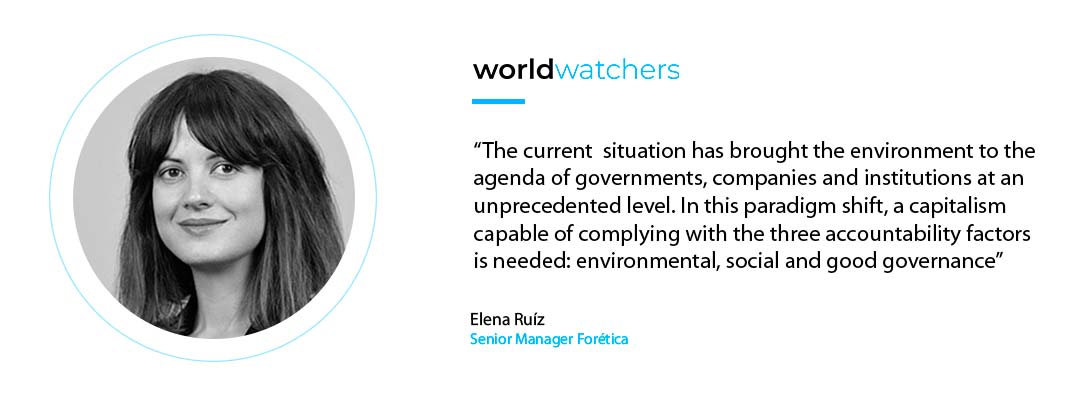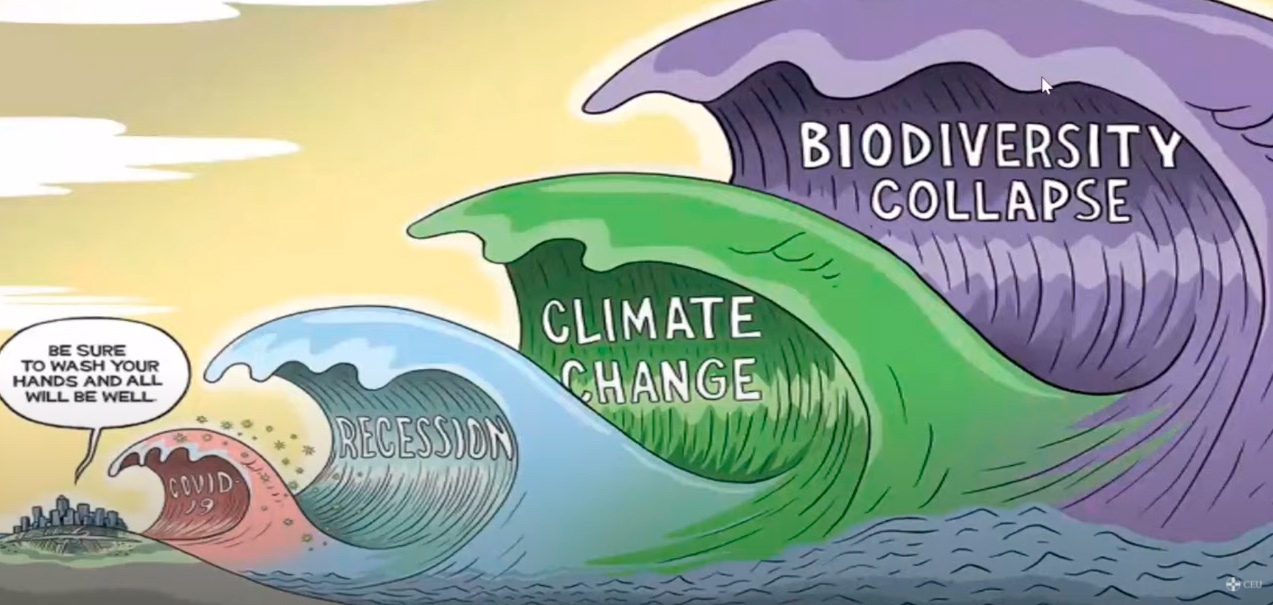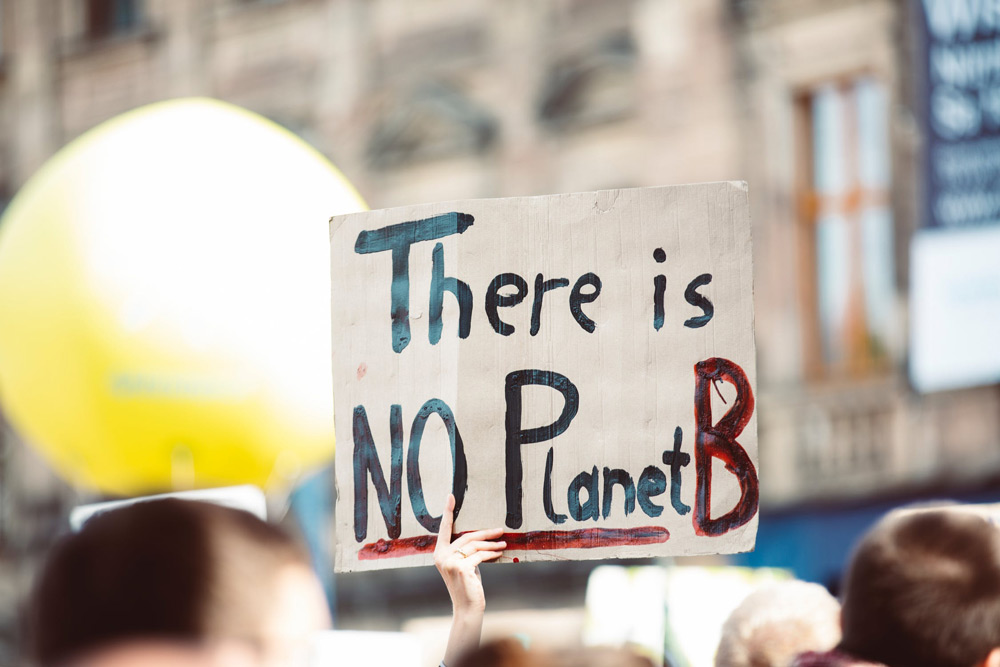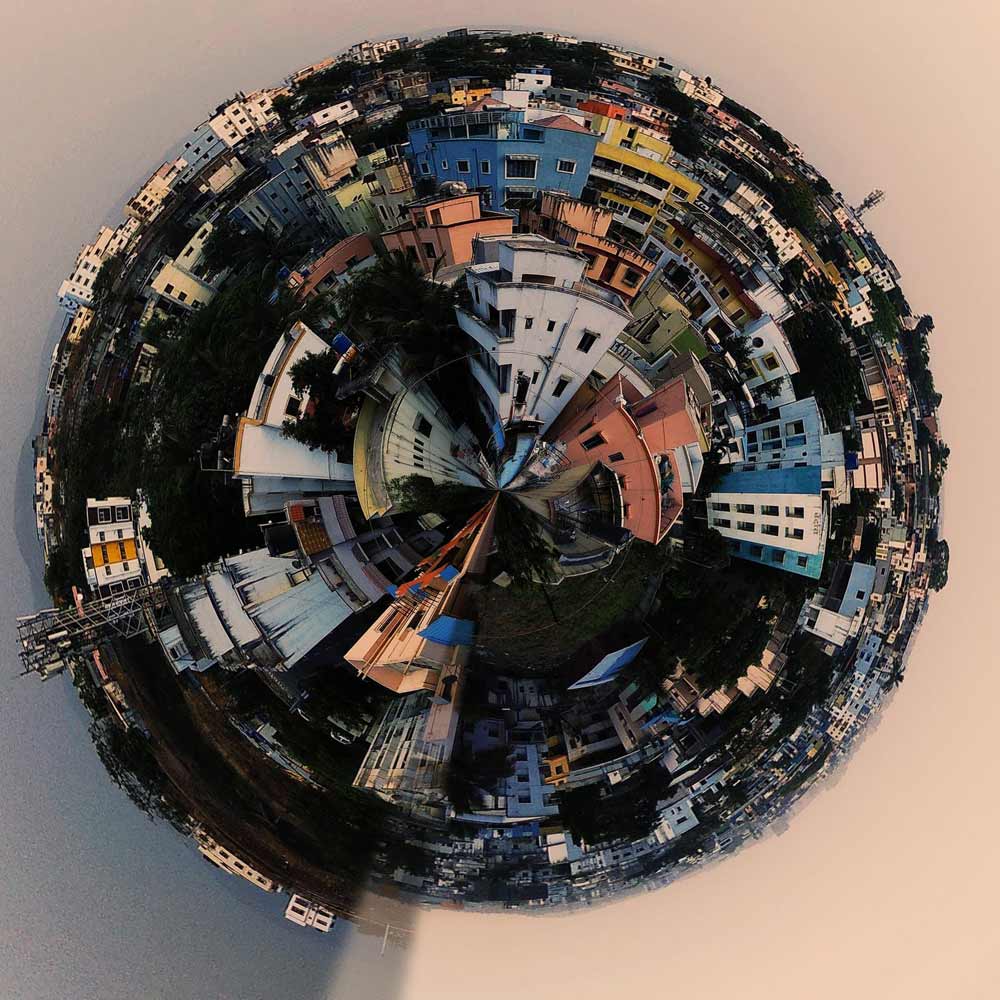We hear now more than ever about the need for change, about a new capitalism that responds to three accountability factors: environmental, economic and social. In order to achieve this, Forética proposes three key trends in Sustainable Development: green regeneration, social reconstruction and resetting the current concept of capitalism.
Together with Elena Ruíz, who heads the Forética Circular Economy Action Group and is the Coordinator of the International Area, we are going to analyze these trends in Sustainable Development.

A paradigm shift
The year 2020 started with a series of events that can be considered indicators of a paradigm shift:
- The World Economic Forum, better known as the Davos Forum –the one that brings together the main business and political leaders– published the “Davos 2020 Manifesto“. One of the basic principles of this manifesto refers to the fact that companies can no longer only be agents that create capital, with an economic impact, but they must also have an impact on people and the planet.
- Times magazine named Greta Thunberg as the “Person of the Year.” This is also representative of that paradigm shift in the motivations of the different age ranges of society.
- BlackRock, the world’s largest investment fund, announced that it was going to prioritize Sustainability. This decision implied, among other things: not investing in companies related to fossil fuels or involved in a possible violation of Human Rights, having transparency issues, etc.
Unfortunately, 2020 also brought a global pandemic that would disrupt the lives of most people on the planet. Coronavirus turns everything into something much more complex and puts on the table the vulnerability of the concept of globalization.
The second great enemy of the paradigm shift is the lack of risk management. The truth is that we are not capable of managing risks early enough to be resilient and be able to tackle whatever may come.

The World Economic Forum has already published the risk map for 2021. The top 5 risks are: extreme weather events, failure of climate actions, human-induced environmental impact, infectious diseases and loss of biodiversity.
Three keys to recovery
This situation has brought the environment to the agenda of governments, companies and institutions at an unprecedented level. In this paradigm shift, a capitalism capable of complying with the three accountability factors is needed: environmental, social and good governance. The key to recovery is going to be what Forética has called the three R’s: regenerate, rebuild and reset.
1. Green regeneration
When we talk about green regeneration we refer to four big trends
Climate action
We have a great common goal ahead of us: to be net positive in 2050. This means reducing emissions by 45% in 2030 and reaching 0 emissions in 2050. In order to do this, we need to “decarbonize” ourselves by 7.6% each year in this decade of action (2020-2030).
The “linear economy” has favoured environmental degradation. In this type of economic paradigm, we take the resources we need, produce with them, and then throw them away. Since 1970 we have multiplied by three the extraction of raw materials in a way that around 22 elements of the periodic table will be at risk of scarcity within 50 years. We have generated so much waste plastic, textiles, etc. that we have collapsed oceans and ecosystems.
Circular Economy
Unlike the linear economy, the circular economy is a new economic model in line with the planet and with people. It is more competitive, resilient and sustainable.
In a circular economy, waste does not exist because it is re-used. This makes it possible to considerably reduce the pressure on natural resources and ecosystems. This “zero waste” reduces the carbon footprint, lengthens the life of products and improves the health and well-being of people.

Protection of natural capital
Another of the big challenges that we face in the green regeneration is the degradation of natural capital. The loss of biodiversity has harmful consequences. It affects, for example, the increase in zoonotic diseases (those that are transmitted from animals to humans). This is because the forest mass that separated us from wild animals has significantly reduced due to deforestation.
In addition, according to IPBES (Intergovernmental Scientific-normative Platform on Biological Diversity and Ecosystem Services), out of the 8 million species that exist in the world, one million will face extinction in the coming years.
Resilient cities
Cities play a major role in helping to achieve global sustainability. At the moment more than 70% of the world-wide population lives in them.
Demographic changes, urban planning, environmental impact, inequality… these are some of the challenges which cities face. In this sense, improving urban mobility, the sustainable use of technologies and infrastructures, as well as the support to a style of healthful life, etc. will be determining factors to face them.
According to the World Business Council for Sustainable Development cities consume around 75% of the natural resources that are generated at world-wide level, accumulate 80% the power demand and generate around the 70% of the emissions at global level. Will we be able to make cities more sustainable places?
2. Social rebuilding
Another key tendency in sustainable development is social reconstruction. According to Forética, this second R is about human rights, inequality gaps, acceleration of processes of digitalization and innovation, as well as health and well-being.
Poverty and inequality
When we address issues like poverty or inequality, it inevitably seems like are associated to developing countries. However, the reality is very different. As the Spanish newspaper El País informs 75% of the people who are suffering from severe poverty in Spain, are Spanish.
Neither the governments nor the people must turn their backs on this current context of inequality. According to the World Bank, extreme poverty will have increased by 150% in 2021. Given this situation, the motto of the agenda 2030 “Leave no one behind” becomes meaningful. We cannot afford to leave anyone behind.
A responsible technological transition
Another challenge is the future of work and a responsible technological transition. Technology has had a major impact on employment to the point of changing the skills that are valuable. This means that, in many sectors, professionals will have to be “retrained”. According to the World Economic Forum, between now and 2025, 40% of workers will need training processes of up to six months to update their skills. Therefore, whoever understands which the skills of the future are going to be, will have access to a greater number of job opportunities.
A healthier society
And finally, it is not possible to speak of social reconstruction without mentioning health. And not only physical health, but also mental health. The World Health Organization announced, shortly before the crisis caused by COVID-19, that the negative impact of mental health problems on business productivity reached the value of 1 trillion dollars a year. In view of this situation, the IBEX 35 companies have promoted a Health, Well-being and Sustainability Observatory.
3. Reset the concept of capitalism
Here is the last of the Sustainable Development trends that Forética proposes: resetting the concept of capitalism. This deep reset has a direct impact on the four levers of sustainable governance:
Purpose
Every year, the Edelman Trust Barometrer is published, which measures the level of trust that different stakeholders have between them. Companies have increased the trust that other stakeholders have towards them. Governments, however, have lowered their popularity.
And we are in the era of activist CEOs. Paul Polman, former CEO of Unilever, was among the first to include in his narrative the importance of meeting the Sustainable Development Goals and those three challenges that companies face. Consumers are increasingly sensitive to sustainability measures. Hence, we are witnessing the awakening of a more conscious consumer.
Due ESG Diligence
More and more, companies are implementing the ESG (Environmental, Social and Governance) criteria at their shareholders’ meeting. In fact, this type of information is duplicated in the shareholders’ meetings of the “Fortune 100” (the list of the “top” 100 companies in the United States due to their turnover). This is a good indicator to check that companies are taking action.
Accountability/Transparency
The reporting framework has grown a lot in recent times since transparency is increasingly demanded from companies. There are some factors related to climate change, human rights, work environments… Companies have to understand how to be transparent and how to reach their stakeholders. This year will be key for companies to refine how to reach them.
Consumer approach
The Top 10 Global Consumer Trends 2020 report highlights that 69% of professionals anticipate a consumer that is more sensitive to sustainability issues. This for many companies is going to be something beyond a business issue. Not only because investors want to invest in corporations that have responsible management, or because willingness in the legislative aspects is coming to an end, but because companies have to respond to an activated consumer.
The feasibility of a new model of production and consumption is possible is good news.
 Forética is the leading organization in sustainability and corporate social responsibility. Its mission is to integrate social, environmental and good governance elements into strategy and management at companies and organizations. It currently comprises more than 200 partners, including 40% of the companies listed on the IBEX 35, as well as subsidiaries of multinationals, small and medium-sized companies, leading NGOs and personal partners.
Forética is the leading organization in sustainability and corporate social responsibility. Its mission is to integrate social, environmental and good governance elements into strategy and management at companies and organizations. It currently comprises more than 200 partners, including 40% of the companies listed on the IBEX 35, as well as subsidiaries of multinationals, small and medium-sized companies, leading NGOs and personal partners.
Elena Ruiz gave the lecture “Key Trends in Sustainable Development” during the World Watchers event promoted by the CEU-UCH University. Elena has more than 15 years of experience advising companies from the public and private sectors in their progress towards sustainable development in Spain and Latin America through research activities, technical support, development of public policies, business leadership actions and training. Currently, she leads the Forética Circular Economy Action Group and is the Coordinator of the International Department.












